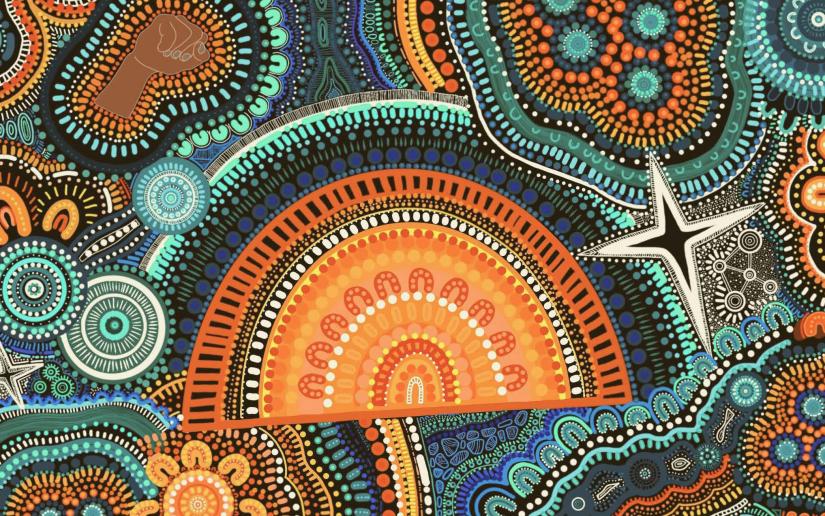Incidents of racism arising in the context of the referendum on the Voice to Parliament figured in nearly one in five reports to the Call It Out Racism Register in the months before and after the referendum.

Report cover artwork by Kirsten Gray
The newly released Call It Out Annual Report for 2023-2024 – “If you don't think racism exists come take a walk with us” is the register’s second annual report on racism targeting First Nations people.
An initiative of the University of Technology Sydney’s (UTS) Jumbunna Institute of Indigenous Education and Research and the National Justice Project, Call It Out’s latest analysis is based on 453 validated reports of racism in the 12 months from 21 March 2023 to 20 March 2024.
In his introduction to the report Industry Professor and Jumbunna Institute Director Lindon Coombes said that while racism remains an imposing adversary, there is reason for hope.
“And this hope often comes from the darkest moments. One of our darker moments in this regard was the 2023 referendum,” he said.
“We have learnt that we need to better understand the forces that actively work against us, as well as the unconscious biases that have been hardwired into Australian culture and worldviews as a result of our colonial past, and this report is a key tool in this endeavour.”
Report co-author Associate Professor Fiona Allison said reports made to Call It Out, “often contain multiple incidents of racism experienced or witnessed by the same person – sometimes occurring over many years and across generations, and can include multiple victims, including children.
“Consequently, the overall number of reports is a significant undercount of the actual incidents reported and those impacted,” she said
Co-author Professor of Criminology Chris Cunneen said, “The data tells only a partial story of the problem of racism and its real and long-lasting impacts.
“The strength and power of the Call It Out Register is the brave and compelling narratives and experiences shared.”
The key findings from the report were:
- The most common types of racism reported were negative attitudes or stereotyping (23%) and discrimination (15%), followed by hate speech (13%) and non-recognition of cultural rights (11%).
- Aggressively racist behaviour was also evident – taken together physical violence, verbal abuse, hate speech, threats, intimidation, bullying, and damage to property comprised 35% of responses.
- Almost two thirds of reports (62%) were made by witnesses of racism and a third (31%) by First Nations people directly experiencing it. The remainder were made by friends/relatives (7%).
- Overall, racism online and in the media was the most commonly reported location of racism (32%), followed by public places (13%) and the workplace (12%).
Online hatred that aligns with the oldest of colonialist perspectives about First Nations people reinforces my belief that a significant portion of Australia will always be racist (self-report)
- Notably, 22% of reports identified government and private institutions or services as the location of incidents, including in legal, education, health and transport.
Knowing how the health system, working in collaboration with child protection and police, operates to systematically surveil and discriminate against First Nations people raising children, I feel instantly tense. I know I need to be careful (self-report)
- In the legal system, patterns of behaviour within policing was a focus, including use of unreasonable force and racial profiling.
- Perpetrators of racism emanate from all social classes, age and cultural groups. There is no template for a racist.
- The most common feeling racism gave rise to was anger (19%), followed by disappointment (16%), sadness (11%) and motivation to bring about change (11%).
- The most common stand-alone response to racism was to talk with family and friends (34%), though overall a range of other proactive responses were also common (including verbal defense of oneself or another, complaints to social media platforms, reports to anti-discrimination bodies, police, unions etc.).
- One in five identified that nothing could be done about racism and/or that they did nothing as they weren’t sure what action to take.
- A sense of powerlessness, fearing repercussions and other barriers make it very hard to call racism out, and doing so may fail to produce a sense of justice or other constructive outcomes.
- There were calls for greater accountability, including for those responsible for online commentary – with some platform owners identified as setting up a space specifically for the voicing of racist attitudes.
The moderators either allow, are complicit or leave the topics and posts up permanently or long enough to cause social harm (witness report)
- Nearly one in five of all reports (18% or 81/453) specifically mentioned the Voice and/or the Referendum. Of these, roughly two thirds (67%) we made by witnesses. Slightly more than a quarter (28%) were made by First Nations people directly experiencing racism.
My 12 year old nephew was involved in a group chat with his school 'friends' last night, they made comments including 'ur a monkey', 'no wonder why everyone voted no', 'at least I have a voice', 'Proud to be the one who stole ur land', ‘Why are u talking i thought everyone voted no for u to not have a voice' (friend or relative report)
Call It Out was created to ensure that people have a place to give voice to their concerns and experiences, be heard and contribute to a collective understanding that can help shape a better future. A key objective is to generate evidence to support First Nations leaders, organisations and advocates in garnering support and resources to develop further tools and strategies to address racism and discrimination, including through systemic and cultural change. Find out more here.

